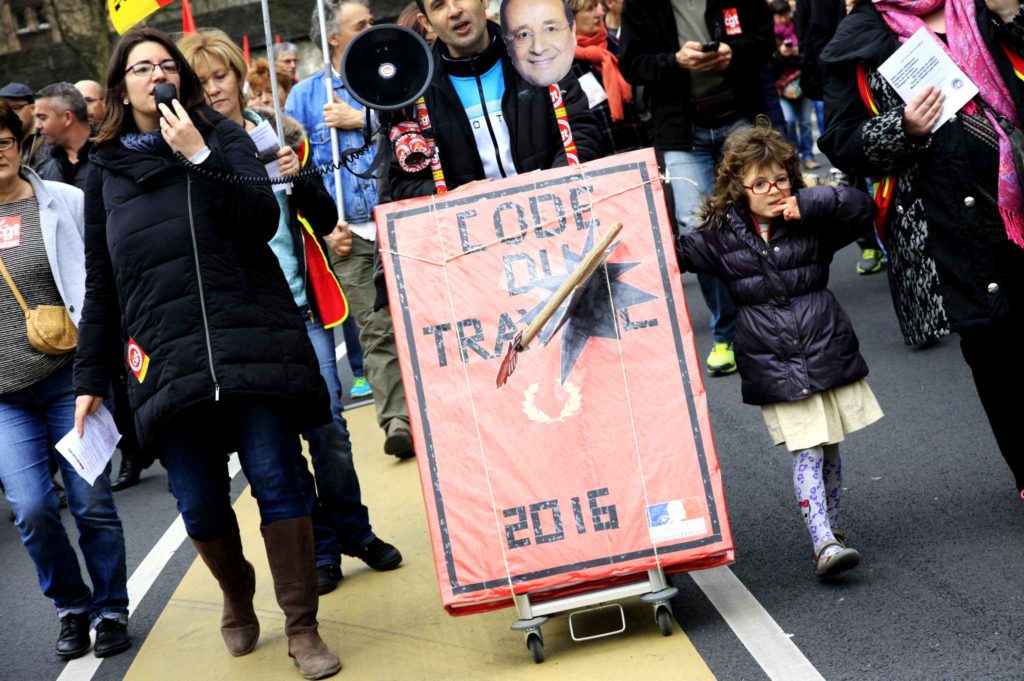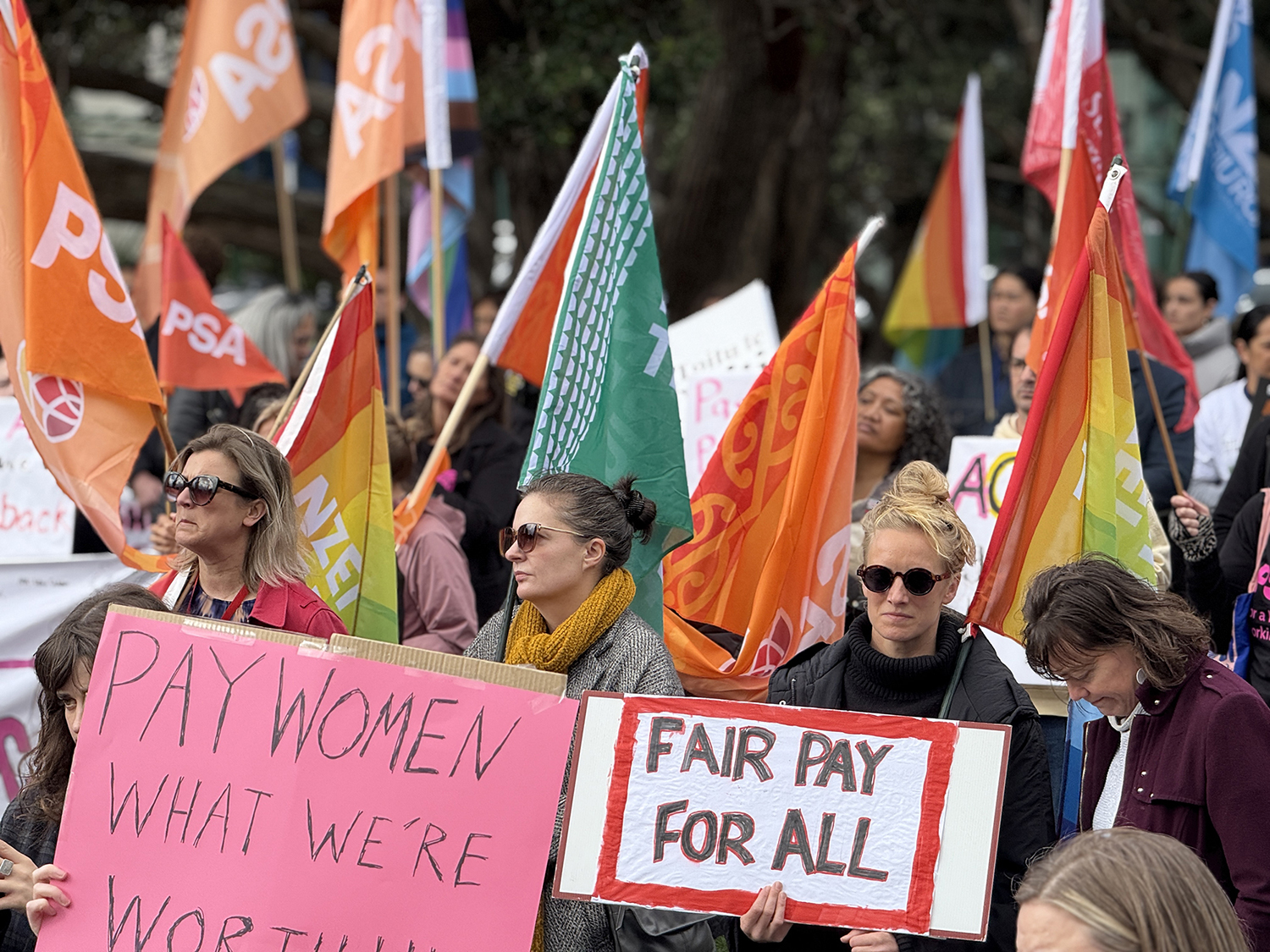Clément is a university professor in Paris. He is 32 years old and has been an activist in the New Anticapitalist Party (NPA) since it was founded in 2009. He responds to the ISO’s questions on about the social movement against the labour law in France.
Translation was provided by Brittany Travers and Cory Anderson.
What is the code du travail and what significance does it have for French workers?
The “code du travail” (labour code), is a document that brings together the legal regulations governing the rights and duties of employers and employees. It is an important legal tool that offers workers special protection against their employers.
Obviously, the labour code isn’t a “gift” offered by just any enlightened, generous government. It was won with the sweat, tears and sometimes the blood of workers. It reached its first draft in 1910, due to large strikes that were repressed in 1906 and 1908. Since its genesis, the labour code is in a constant state of evolution. It is the culmination of more than a century of social struggle.
The labour code has always been the object of attack by employers. Today, these attacks are largely played out by the media, the right and François Hollande’s government (which still claims to be left). The labour code is allegedly ‘too outdated,’ ‘too complicated’, ‘too restrictive’ for employers who need more ‘flexibility’ – even for the workers who would apparently like to have the ‘freedom’ to work more.
But this propaganda does not take hold of the minds of most workers, and the labour code is still perceived to be one of our most important social gains.
What reform does the government plan to make to the labour law?
The government was forced to significantly back down on its law a short time after the protests. Despite this, a large number of attacks on workers remain in the law: minimum compensation in the event of unjustified dismissal, the chance to pay workers less for overtime, procedures for “economic redundancies”, attacks on the limitations of working hours in the name of “flexibility”, etc.
Above all, the spirit of this law has been preserved. But two big scams remain. The first is to do with making us believe that people cannot be employed as easily, because of the current state of the labour code. Fundamentally, it has been said that if there is mass unemployment in the country, it’s because the workers are protecting themselves too much from their employers, which makes their employers scared to take on new staff. With working conditions that don’t stop worsening, this sort of rhetoric is obscene. But above all, it’s just incorrect. Unemployment in France isn’t due to the “unemployability” of workers. Employers are simply not taking on new staff because they are not managing to sell their products. All the “gifts” that have been given to employers won’t change this. Indeed, laying off staff and increasing working hours will increase unemployment even further. The second scam consists of portraying collective bargaining in businesses to be “progress” in regards to this law. It’s as if the relationship between workers and their employers was equal. As if democracy exists in business. With several million unemployed people waiting to get their foot in the door, promoting workplace “bargaining” is still reinforcing employers’ power of blackmail.
Fundamentally, we are witnessing an important event in our history. While the raison d’être of the labour code is to protect workers from their employers, Article 1 of the new law stipulates that “the fundamental rights and freedoms” of workers can be subject to “justified limitations (…) which are necessary for the proper functioning of businesses.” Basically, workers’ rights must not get in the way of their bosses.
What is the context in which the government is introducing the reforms? Why might they be reforming the labour code at the current moment?
France has not emerged from the 2008 global financial crisis. The trend over the past few years has been a dramatic increase in unemployment of more than one million, since Hollande came into power in 2012. Economic growth remains very weak. The only way for employers to maintain their profit margins is to put more pressure on workers. Manuel Valls’ government does this dirty work very well. He already fired a few warning shots on workers’ rights with the 2013 “ANI” (National Workers’ Agreement) and the 2014 “Macron” law (named after the merchant banker turned economic Minister). Every time, the response from the workers has been too weak; and it’s been backed up by just a few trade unions, or completely submissive ones.
Overall, this government’s policies are clearly right-wing in almost every way. Monetary policy serves the rich, immigration policy is xenophobic and racist, foreign policy is imperialistic…All of this serves the interests of the National Front (extreme right party) which is fast becoming the top political force in terms of electoral votes.
What protests against the “reforms” have occurred? Have any particular sections of workers and the youth been involved?
As for trade unions, calls to protest and strikes are spaced out from each another, and this threatens to take the life out of the movement. However, with each call to action, the response from workers is massive. The ability for the public to express their anger autonomously is restricted by the direction of the trade unions. In fact, the first big protest grew out of a call to action on Facebook (which the trade unions have finally had to rally behind). The movement is supported by sectors (like posties or railway workers) that are working to join their sectors’ battles together. The ‘savage’ high school and tertiary student strikes are helping to breathe life back into the movement, in between the strikes that take place on dates chosen by unions. On the 31st of March, an unexpected phenomenon occurred, independent of political parties and trade unions: the ‘Nuit Debout’ (‘Rise up at Night’ movement. Every evening since that first night, hundreds, even thousands of people come together on the Place de la République in Paris. The first protest was to denounce the so called “workers’ law”, a call that grew stronger with the global protest against political institutions and the economic system. A sort of little oasis of democratic debate was born right in the heart of Paris. Other more modest Nuits Debouts have occurred in other big cities. But the movement is struggling to make real political traction. It’s sociological heart remains relatively restrained (students and young academics in insecure work). The political heterogeneity of the movement coupled with the search for consensus at all costs makes decisions on protest action difficult, even impossible.
Can you explain a little about the importance of high school and university students protests in France? What role have they played in the current movement?
Historically, young people have had an important role in social movements in France. We remember the revolutionary explosion of May 1968, which started out as an immense student protest movement before being followed by the largest general strike in the history of France. More recently, we can cast our minds back to the 2006 movement against the government’s “first job contract” policy a relatively modest measure that was aimed at making work even more insecure for workers, but was specifically targeted at young people. The response from young people was strong (blockades at universities, fist-fights). It was also widespread, with up to 3 million protestors. The government had no choice but to back down. However, after about ten years, the high school and university student movements are rare, and weak. With this latest movement, a great number of young people are experiencing the struggle for the first time in their lives.
Of course it is the Socialist Party (PS) that has introduced these reforms. What impact has this fact had on the movement? What is the relationship between the Socialist Party and the unions?
For a long time now, people have lost all hope that the socialist party will implement any kind of left political agenda. It seems that the party generated more discouragement and resignation than anger. However, this current movement has shown that things can change. The direction of the trade unions is always linked one way or another to the party, and the unions have become a lot less aggressive than they were under the Sarkozy government. This especially includes the CFDT (French Democratic Confederation of Labour), a class collaborationist union that has the tendency to swiftly sign everything the government drafts, by order of the MEDEF (Movement of the Enterprises of France). This is what happened with the employment legislation:- the government slightly modified the text after the start of the movement. The General Confederation of Labour, the other important union in France, (and more to the left than the others), is becoming more and more torn between a relatively submissive direction and its membership base who want it to cut its ties with the government.
What of the political left?
The main political parties on the left of the Socialist Party are against this law. The Socialist Party itself is quite divided over the text. The Socialist Party even has to use Article 49.3 of the French Constitution to force Parliament’s hand, (pass the Bill), because even with its socialist majority, Parliament refuses to pass the law. Even in their own institutions, the political lackeys of the capital get nowhere…
Finally, are there any other comments you would like to make?
What this movement shows is that as far as the struggle is concerned, everything is changing. Few among us would have imagined such a battle just one year out from the Presidential elections, after such a long period of feeble battling. This battle was going on in the midst of a “national state of emergency,” when the November 2015 terrorist attacks caused a “political recovery” for the government that asphyxiated public debate. We can be sure that in France, as in other parts of the world, the class struggle has even more surprises in store for us…








